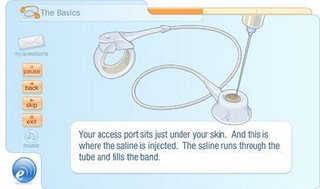
The men of Charlie 2-4 fly Black Hawks over a landscape too dangerous, too wrecked for road travel. They fly into the hot, violent cities, the mud-brick towns, the nowhere stretches of desert, picking up American and Iraqi soldiers, civilians, and, sometimes, enemy fighters. For medevac crews, there are missions, and the space in between. Earlier today, Charlie 2-4 rescued three Iraqi boys wounded in a bomb blast in a rural field. Blood and mud caked their bodies, stubs of straw clung to their bare backs like a pelt. The mission reset the clock, the psychic countdown. Now comes a rush of static and an anxious, tinny voice on the radio: Insurgents have attacked a U.S. Army patrol somewhere on a highway south of Baghdad. One of the soldiers is badly wounded.
More.
My hat is really off to these soldier-health care providers. I don't know how they truly can do the job they do. I get annoyed when we run out of something in the supply room on the floor, and yet they can function on a battlefield.
Medicine Tag
Health Tag
Save This Page







